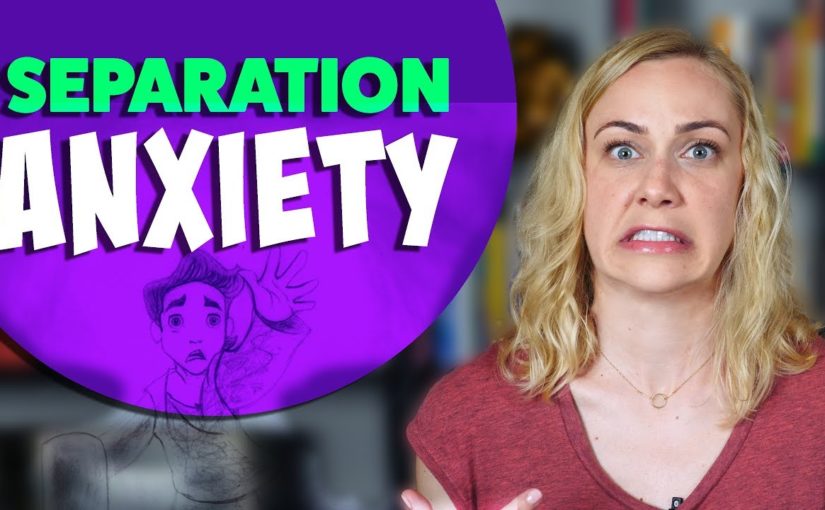hey everybody today we're going to talk about separation anxiety what is it and how can we overcome it but first are you new to my channel welcome make sure you are subscribed and have your notifications turn on because I release videos on Mondays and on Thursdays and I don't want you to miss out but let's get into this topic separation anxiety is actually a disorder that's found in the dsm-5 in previous DSM s this could only be diagnosed in children but recently they've realised that this can occur in adults as well and they have expanded the diagnostic criteria which is as follows number one developmentally inappropriate and excessive fear or anxiety concerning separation from those whom the individual is attached and as evidenced by at least three of the following okay so we have to have that and then we have to have at least three of the following criteria number one recurrent excessive distress when anticipating or experiencing separation from home or from a major attachment figure so we have to just get really upset if we have to be away from someone who really care about number two persistent and excessive worry about losing a major attachment figure or about possible harm to them such as illness injury disasters or death number three having persistent and excessive worry about experiencing a distressing event like getting kidnapped being in an accident etc and that distressing event will cause separation from a major attachment figure so again we just don't want to be separated from them it makes us really upset number four persistent reluctance or refusal to go out away from home go to school go to work or elsewhere for fear of separation you can see how this is all like I just don't want to be separated from them number five persistent and excessive fear of or reluctance about being alone or without a major attachment figure at home or in other settings number six persistent reluctance or refusal to sleep away from home or to go to sleep without being near a major attachment figure and number seven repeated nightmares involving the theme of separation number eight repeated complaints of physical symptoms include headaches or stomach aches when separation from a major attachment figure occurs or is anticipated now just to recap we need to have at least three of those eight that I just listed off and so just keep that in mind as I move through the next portions of the diagnosis and the next is the fear anxiety or avoidance is persistent lasting at least four weeks and children and adolescents and typically six months or more in adults and that's important when we're diagnosing we need to know how long this has to been going on because following a trauma maybe we might experience some of these symptoms but it typically wouldn't last for you know more than a month or more than six months and finally the disturbance has to cause clinically significant distress or impairment and make it hard for us to dysfunction in our life and it cannot be better explained by another mental disorder like autism spectrum disorder agoraphobia generalized anxiety disorder etc in truth separation anxiety is really a survival technique that kept us safe when we were a baby and if our caregiver leaves us will cry and become extremely distressed so that they come back and care for us because we need it because we can't survive on our own right but after the age of two most children know that even if their caregiver leaves they'll come back they may cry a bit at the beginning like if your first dropping your child off at daycare they can fuss a bit but they'll be easily soothed and go back to plane or whatever they were doing they can integrate easily without becoming completely overwhelmed and for that reason the key feature in diagnosing separation anxiety disorder is that the level of distress or anxiety that we experience is much greater than what is expected at that developmental stage I just want to pause for a minute so you can fully absorb that it doesn't always have to do with age necessarily it's all about developmental stage and what's expected for us and our response to our attachment figures at that stage children who struggle with this can cling to their attachment figures unable to be soothed by anyone else and even report feeling physically ill if they're separated from them adults with this disorder may be uncomfortable when traveling independently they can experience nightmares about separating from attachment figures or even the really concerned with their children or spouse and continuously check up on them about their whereabouts and how they're doing also I think it's important to note that separation anxiety disorder is often referred to as fear of abandonment in adults and as far as I can read and research about it these two terms were used to describe the same symptoms now my guess is that we have these two terms because they used to think separation anxiety only happened in children and so they had to come up with another term for the same symptoms in adults but that's just my hypothesis what do you think while we don't know the exact cause of separation anxiety we do know that children who have dealt with loss like death of a loved one or a pet change of schools divorce etc are at a higher risk for developing it we also know that overprotective or anxious parenting can lead children to developing separation anxiety disorder as well but other than that there needs to be a lot more research done because they're still looking into genetics and they're not completely sure which ones cause what but the good news is that there are treatment options to look into in number one for children slight changes and parenting techniques can really really help you can communicate that you have to leave telling them ahead of time so they have a little time to prepare and letting them know how long roughly you'll be gone and remind them a few times that you will be back and make sure you don't tease them or become upset about their anxiety just assure them that you will return and remain calm while you're speaking with them about it so that they don't think you're anxious to that can just make it worse really also don't leave during naps or try to sneak out I know a lot of parents try to do this because it just makes it easier you don't have to be there when they're really upset but not giving them the time to be part of the transition and given the opportunity to be soothed can make it even worse and it can make it last even longer you can also practice short separations like walking to the corner to drop some mail off and coming back or even just leaving the room for a bit only to reappear a few seconds later and this can really help young children understand that separation just because they don't see someone is temporary and there's nothing to be scared of because they will come back for adolescents or adults psychotherapy helps so so much talk therapy can help us uncover where this fear or anxiety comes from and what triggers it once we know what triggers it then we can try out our new techniques to self-soothe or distract when we need to since this can be caused by loss grief counseling or even trauma therapy like EMDR somatic experiencing attachment based therapies etc they can help a lot too and third medication like SSRIs SNRIs have been shown to help as well because if you remember this is an anxiety disorder an inter depressants are known to relieve anxious symptoms so please speak to your doctor if this is something that you're interested in I know doing hard work like this can be overwhelming and often upsetting but trust me if we find the right therapist to work with it can and will get better this video has been brought to you by the Kenyans on patreon if you would like to support the creation of these mental health videos click the link the description and check it out and please share this video too you never know who it could help and last did I leave anything out treatment options or symptoms that you wish I'd mentioned what's been your experience with this let us know in those comments down below and I will see you next time bye

As found on YouTube



